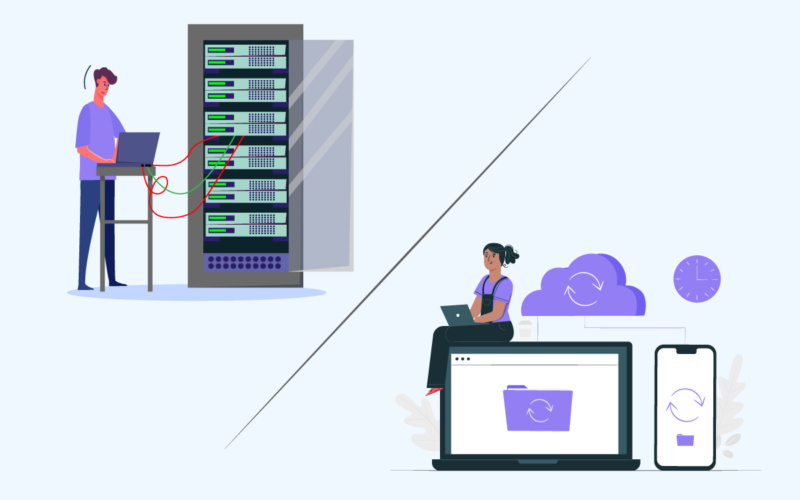Phone systems are a significant investment that, if implemented wisely, may help your company reach new heights by streamlining processes and offering an excellent end-user experience.
For many companies, on-premise phone systems are still the best option. However, with the growth of the virtual cloud phone system and its affordability, it may be better to switch to a less expensive option.
Both on-premise and virtual cloud phone systems offer a different range of features, and also they differ in delivery.
However, it’s no surprise that cloud hosting is becoming more popular for company phone systems. According to recent statistics, up to 96 percent of businesses already use cloud communications solutions, mainly owing to cloud servers’ scalability.
At the end of this, the article will help you choose the best business phone system for your business.
What’s an on-premise phone system?
An on-premise phone system is a traditional PBX (Private Branch Exchange) that has been installed in your office. It requires time and money up-front, but it usually provides better value for money and a great customer experience.
The customer installs an on-premise system and manages it, typically on their premises. It includes an internal phone network, a private branch exchange (PBX) or other switches which hold the key to the data and telephony services for the business, and a phone handset for every employee.
With an on-premise system, there is always someone in charge of ensuring that it’s running smoothly. In this way, you save money from not paying monthly fees to a service provider for an off-premise service because you have this taken care of internally.
Advantages of an on-premise phone system,
However, some businesses still prefer on-premise solutions over cloud-based ones. The following are some advantages of an on-premise phone system:
#1. Consistent Voice Quality
While today’s cloud phone systems offer excellent voice quality, they are susceptible to various external variables that can impede communication. Bandwidth, network setup, and the devices used are all considerations.
On-premise telephony often requires a one-time charge during installation, but maintenance and downtime can add up over time. On the other hand, Cloud telephony typically needs clients to pay a monthly hosting fee and upfront fees for endpoints, but it can be less expensive in the long term.
#3. Management Control of Communication
On-premise telephony allows communication managers and business owners to have on-site control, but it will almost certainly require someone trained to do so.
What’s a Virtual Cloud Phone System?
A Virtual Cloud Phone System is hosted over the internet and doesn’t require any initial investment or installation costs to use it. An internet service provider operates it.
The system can be accessed through a web browser, computer, or mobile device. The system provides voice mail, faxing, call recording, and other features usually not found in traditional phone systems.
One of the advantages of a cloud phone system is accessing the interface from any place with an internet connection. The interface is not dependent on hardware or software like a traditional phone system.
Advantages of Virtual Cloud Phone System
The Virtual Cloud Phone System connects you with people in different ways. It’s important because it provides immediate access to your voicemails and phone calls as soon as they come in, no matter where you are or what type of device you’re using. Let’s have a look at the benefits of Virtual Cloud Phone System:
#1. Durability
The level of scalability that cloud telephony provides enterprises is the most visible advantage it has over traditional phones. It enables service adjustments in response to seasonal and industry changes.
Furthermore, unlike conventional phone systems, cloud phone systems allow for automatic installation, whereas traditional phone systems require manual upgrades, which can be time-consuming and cause downtime.
#2. Flexibility
Your staff doesn’t have to work from the office any more thanks to cloud phone systems, and they can work from any place if they have decent internet access. Working from home gives your team greater freedom in planning their days, allowing them to be more productive.
#3. Improved Team Communication
Virtual team communication has become a necessity. One-third of companies lose customers due to communication problems – it’s undoubtedly worth improving companywide.
One of the benefits of cloud-based phone systems is their performance. Here are a few ways it makes team communication easier:
- Give individual phone extensions to each team member to be reached easily from a shared directory.
- Collaborate with coworkers using a single app that includes one-on-one and group discussions.
- Jump on a video call and easily share your screen.
#4. Easy Call Management
Extra capabilities in cloud phone systems help your team arrange and manage business calls. This enables you to simply acquire data from your consumer base in addition to optimizing your procedures.
#5. Excellent call quality
A good cloud phone solution will provide you with high-quality phone calls.
HD voice codecs provide twice the bandwidth, allowing everyone in the call to hear a wider variety of sounds. Customers won’t have to repeat themselves, and every call will be a pleasant experience for them.
Since then, they have benefited from the proven reliability of many data centres. The features like call recording, call monitoring, call queuing, IVR, etc. have made running and managing a cloud-based virtual call center even easier.
Which is best for your business?
We know that each phone system has its own set of features and benefits. Nowadays, many companies are shifting to the cloud, and some still choose on-premise solutions.
Is an on-premise system necessary? Or are you able to migrate to the cloud?
Consider these few factors while deciding what’s best for your company.
#1. How much will it cost?
The cost is, without a doubt, the most significant factor to consider when deciding between cloud phones and on-premise phone systems.
Both companies will tell you an upfront cost and a monthly service price when you inquire. However, when it comes to the total cost of ownership, cloud phone system is far less expensive than on-premise systems.
#2. Do you have a team that works remotely?
An On-premise-based phone system makes it more difficult for a remote team member to call in. From the data center to the device, connections are made physically inside the office. As a result, they’re not a good fit for companies with distributed staff.
Cloud solutions, on the other hand, enable remote teams to operate. Employees can access the business phone system from anywhere in the world, and they’ll only need a good internet connection to make and receive business calls without difficulty.
#3. Do you intend to grow your team?
An on-premise phone system is less scalable than a cloud phone system, and this is the case because you don’t require any more wirelines to connect to your on-premise data center.
On the other hand, your hosted provider can add another line to your online account.
Read Also: 11+ Best Virtual Phone Systems For Small Businesses In 2023
Select a provider of business phone systems
It is not easy to choose a business phone system, but you can consider the things listed below. When selecting a new phone service provider, keep the following four factors in mind.
#1. Reliability
How frequently does your cloud provider experience technical difficulties or disconnections? The more uptime you have, the less likely your business phone system will decrease.
#2. Extra features
Check if your provider has any features that can help your employees get more out of the system. Voicemail-to-text, call recording, real-time statistics, and many other available features.
#3. Customer satisfaction
Satisfaction of customers is another vital factor for you to know whether or not your customer is satisfied, and their feedback is equally crucial.
#4. Safety
On the whole, both on-premise and VoIP phone systems are secure. Ask your provider’s security protocols and check if they illustrate how to disclose a vulnerability to discover if they’re serious about security.
On-premise vs virtual cloud phone system
| On-premise phone system | Virtual cloud phone system |
| Hardware reliant | Not hardware reliant |
| Difficult to migrate or upgrade | Not difficult to migrate or upgrade |
| Old technology | New technology |
| Lengthy set-up and installation | Easy set-up and installation |
| It might be not easy after working hours | Can access from anywhere and anytime |
| Complex and expensive to manage | It can be easily managed |
To Summarize
At last, it’s your choice to choose between the two phone systems looking at your company needs and requirements.
To make the best option, you must clearly understand your company’s requirements. Because in this scenario, the question isn’t which phone system is superior, but which phone system is best for your company.
For some companies, however, hosted VoIP will be the best option. Others may find that an in-office on-premise solution provides more benefits.
However, after reading this article, you should better understand what will work best for your company.
Related Articles
- Cloud Accounting: Simple Walk-through Guide For Beginners (+ free tools)
- CLOUD COMPUTING: Definition, Types, Pros, Cons & PDF (Detailed 2023 Guide)
- VIRTUAL PHONE SYSTEMS: The Top Best Virtual Phone Systems For any Business (+ Detailed Guide)
- VIRTUAL ASSISTANT BUSINESS: 2023 Detailed Start-Up Guide (+ Free Tips)
- Cloud Technology: Beginners Guide to Cloud Technology Solutions






